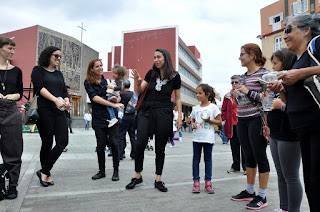This is what I consider a public intervention in the sense that I interact in a space
that we all share at the moment the web. In this sense I am working on an ongoing project
that relates to our pressence in the web and the repercusions.
The experience of confinement during the state of alarm decreed by the Government was,
on the one hand, a bewilderment regarding the consequences of it in my life and at the
same time an opportunity to have some time to investigate the events of the moment.
Due to the physical limitation imposed during confinement, my explorations were reduced
to the realm of the internet and despite being a regular user of it, a whole series of
ideas were awakened in me that would not have occurred if special circumstances had not
allowed it.
The obligation to use the internet to work and communicate made me start to ask myself
issues such as the quality of the communication routes it offers us. Once I began this
exploration, what was emerging seemed devastating to me. Two issues caught my attention
in a particular way: the quality of the contract we entered into with the web and the
consequences on our body.
Quoting Yayo Herrero, confinement "(...) is a temporary window through which we see the
world as it is"
The contract that we have established with the network for the use of it is connected to
the donation of personal data. At first glance, an act without apparent consequences but
unfortunately much more dangerous than we think. Donating data helps create an image of
ourselves that is salable to businesses and governments.
But not only that while we work, information appears around us destined to interest us,
reducing in a certain way our field of vision. Algorithms created to extract information
from us that we would certainly not give out. On the other hand, our body, apparently
confined to our home, now appears traveling virtual paths. While we are forced to cover
our faces abroad, we are forced to undress on the web, while we are limited in movement
and controlled by state security measures, on the other hand, we travel the web without
protection.
This work presents an in-depth analysis of the effects of the transit of women on the
internet. Through images and performance I will investigate the most relevant elements
of this practice.














































